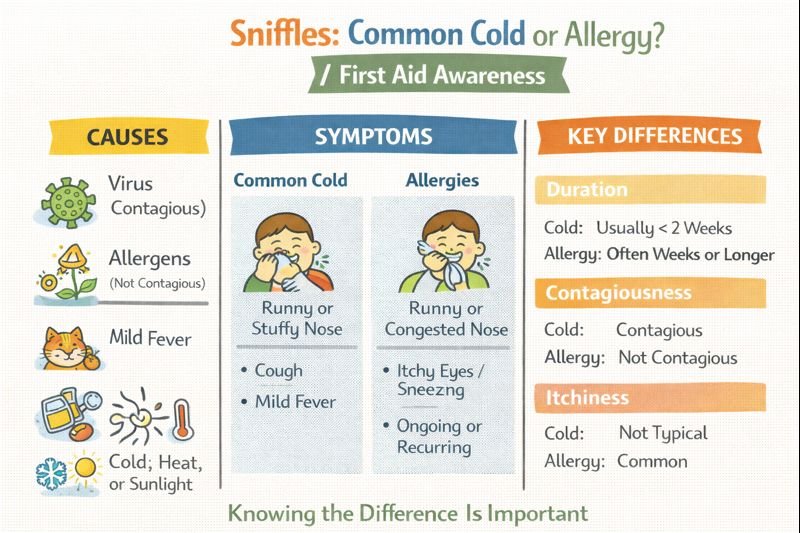Sniffles: Is It a Common Cold or an Allergy? First Aid Awareness in Canada
 Understanding the Sniffles
Understanding the Sniffles
When someone has a runny nose, sneezing, or congestion, it’s often assumed they have a contagious illness. However, many cases of “the sniffles” are not infectious at all. These symptoms can also be the body’s response to airborne irritants or allergens. Knowing the difference between a common cold and an allergy helps people respond appropriately, reduce unnecessary worry, and apply the right comfort measures at home, work, or school.
First Aid & Workplace Relevance in Canada
In Canadian workplaces, sniffles are common year-round. Misunderstanding the cause can lead to unnecessary absenteeism or concern about spreading illness. First aid awareness helps employees recognize typical patterns, practise good hygiene, and make informed decisions about rest, symptom monitoring, and when to seek further assessment.
A Short Realistic Scenario
During a spring workweek, an employee arrives with a runny nose and frequent sneezing but feels otherwise well. A colleague familiar with first aid awareness notices the symptoms worsen near open windows. After closing the window and washing hands and face, the employee feels more comfortable. They later recognize the pattern as seasonal allergies rather than a cold.
What Is the Common Cold?
The common cold is caused by a virus and is contagious. It spreads through:
-
Coughing or sneezing
-
Close personal contact
-
Touching contaminated surfaces and then touching the face
Cold symptoms usually appear quickly after exposure and often resolve within one to two weeks.
Common Cold Symptoms
-
Runny or stuffy nose
-
Sneezing
-
Cough
-
Sore throat
-
Mild fever (sometimes)
-
Body aches or fatigue
If symptoms last longer than expected or worsen, professional assessment is generally recommended.
What Are Allergies?
Allergies occur when the immune system reacts strongly to substances that are usually harmless, such as pollen or animal dander. This reaction releases histamine, which causes inflammation and irritation in the nose, eyes, and throat. Allergy symptoms can closely resemble those of a cold but are not contagious.
Common Allergy Triggers
-
Pollen
-
Dust mites
-
Animal dander
-
Mold
-
Certain environmental irritants
Allergy Symptoms
Allergy symptoms may include:
-
Runny or congested nose
-
Sneezing
-
Itchy eyes, nose, or throat
-
Postnasal drip
-
Cough related to throat irritation
-
Ongoing or recurring symptoms
Allergies may persist for weeks or months and often worsen during specific seasons, such as spring or fall.
Key Differences Between a Cold and an Allergy
Duration
-
Cold: Short-term, often resolves within 7–14 days
-
Allergy: Can last weeks, months, or recur seasonally
Contagiousness
-
Cold: Contagious
-
Allergy: Not contagious
Itchiness
-
Cold: Rare
-
Allergy: Common (especially eyes and throat)
Body Aches and Fever
-
Cold: May occur
-
Allergy: Not typical
Seasonal Pattern
-
Cold: Can happen anytime
-
Allergy: Often linked to seasons or environments
Related Consideration: Sinus Infections
Both colds and allergies can cause mucus buildup in the sinuses. In some cases, this can lead to a sinus infection, which may cause:
-
Facial pressure or pain
-
Thick nasal discharge
-
Headache
Sinus symptoms that persist or worsen over time may need professional evaluation.
First Aid Awareness and General Comfort Measures
For mild sniffles:
-
Wash hands regularly.
-
Avoid touching the face.
-
Stay hydrated.
-
Reduce exposure to known triggers.
-
Rest if feeling unwell.
First aid awareness focuses on comfort, observation, and prevention of spread, not diagnosis.
Workplace and Community Considerations
-
Encourage good respiratory hygiene.
-
Avoid assumptions about illness.
-
Maintain clean shared surfaces.
-
Support flexible work options during peak cold or allergy seasons.
-
Promote allergy and cold awareness in first aid training.
Frequently Asked Questions
Can allergies cause coughing and sneezing?
Yes. Postnasal drip and throat irritation can lead to coughing and sneezing.
How long does a cold usually last?
Most colds improve within one to two weeks.
Are itchy eyes a sign of a cold?
Itchiness is more typical of allergies than viral infections.
Can allergies happen year-round?
Yes. Some people experience symptoms all year, while others are seasonal.
Why is it important to know the difference?
Understanding the cause helps reduce unnecessary concern about spreading illness and supports appropriate comfort measures.
Educational Note
This information is provided for general public education and first aid awareness. Respiratory symptoms can have many causes, and learning common patterns helps people respond calmly and responsibly.

